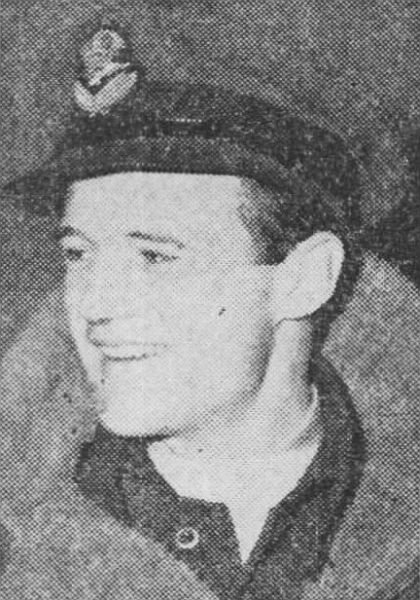Grant, Frank George
- Date of birth:
- August 10th, 1918 (North Sydney, Nova Scotia)
- Date of death:
- September 1975 (Unionville/Ontario, Canada)
- Nationality:
- Canadian
Biography
Do you have more information about this person? Inform us!
- Period:
- Second World War (1939-1945)
- Rank:
- Flight Lieutenant
- Unit:
- No. 423 "Eagle" Squadron, Royal Canadian Air Force
- Awarded on:
- September 19th, 1944
Squadron Leader Grant has been on his present tour of operations since July 1941, when he joined No.504 Squadron (Hurricanes and Spitfires), with which squadron he completed 56 operational hours before being posted to Canada in June of 1942. In Canada he took over a Flight of No.118 Squadron (Kittyhawks) which operated in Alaska for 14 months. He took over command of the squadron and brought it over to England in August 1943, where it became No.438 Squadron, and was converted to Typhoon bombers. The squadron moved to the south coast in March 1944, and has built for itself a fine reputation as a bombing squadron. This has been largely due to Squadron Leader Grant’s quite exceptional accuracy in dive bombing which he has imparted to his pilots. The squadron beat all records at Hutton Cranswick practice camp in May 1944.
On June 6th, Squadron Leader Grant led a section in a very accurate attack, under difficult circumstances, on the beach at H-Hour. On June 16th, he scored two hits in a low level attack on a railway tunnel. On June 29th his bombs destroyed a bridge over the River Dives, and on July 6th he led his squadron on an attack against an enemy headquarters in a chateau near Caen. The attack was pressed home in the face of intense flak, and the chateau completely demolished, Army sources stating that only one bomb missed the target.
Squadron Leader Grant’s exceptional powers of leadership and personal courage, added to his remarkable skill in dive bombing, have been an inspiration to his squadron."
- Period:
- Second World War (1939-1945)
- Rank:
- Wing Commander
- Unit:
- No.143 Wing, Royal Canadian Air Force
- Awarded on:
- July 10th, 1945
Citation:
"Since the award of the Distinguished Flying Cross this officer has continued to display brilliant leadership and outstanding courage on all types of operations. He has led the wing in all the major actions during the Ardennes battles and despite the fierce opposition encountered has pressed home attack after attack with great skill and courage. During the Rhine Crossing, Wing Commander Grant organized and led the operations of the wing which was employed against the enemy\'s anti-aircraft defences in support of the airborne landings. By his skill and daring many enemy gun positions were silenced. In the subsequent drive across Germany he led many sorties in direct support of the army contributing materially to the rapid advances of the land forces. The great success achieved by his wing has been directly attributable to Wing Commander Grant\'s exceptional skill and outstanding leadership."
"Since the award of the Distinguished Flying Cross this officer has continued to display brilliant leadership and outstanding courage on all types of operations. He has led the wing in all the major actions during the Ardennes battles and despite the fierce opposition encountered has pressed home attack after attack with great skill and courage. During the Rhine Crossing, Wing Commander Grant organized and led the operations of the wing which was employed against the enemy\'s anti-aircraft defences in support of the airborne landings. By his skill and daring many enemy gun positions were silenced. In the subsequent drive across Germany he led many sorties in direct support of the army contributing materially to the rapid advances of the land forces. The great success achieved by his wing has been directly attributable to Wing Commander Grant\'s exceptional skill and outstanding leadership."
- Period:
- Second World War (1939-1945)
- Rank:
- Wing Commander
- Awarded on:
- May 20th, 1947
"Wing Commander Grant was Wing Commander (Operations) at No.143 Wing from October 1944 to August 1945. Throughout the whole of this period of intensive operations, this officer showed the utmost gallantry and greatest determination in leading his Wing against the enemy. His personal courage and enthusiasm were of the highest order, and the determination with which he led his squadrons to attack heavily defended enemy strong points, communications and retreating German columns, often in the face of intense anti-aircraft fire, were beyond praise. During the period of the battle through Holland to the borders of Germany, No.143 Wing suffered very heavy casualties, but in spite of this, Wing Commander Grant\'s keenness and determination maintained the morale of the Wing at the finest pitch, and their outstanding achievements were due in great measure to this officer\'s personal qualities of leadership."
Royal decree no.13
Canadian Gazette of 31 october 1947
Sources
- Photo 1: Newspaper article
- - Newspaper article.
- Air Force Association of Canada
- Canada Veterans Hakk of Valour
- W.R.J. Mitchell






